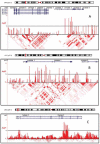Novel loci for major depression identified by genome-wide association study of Sequenced Treatment Alternatives to Relieve Depression and meta-analysis of three studies
- PMID: 20038947
- PMCID: PMC2888856
- DOI: 10.1038/mp.2009.125
Novel loci for major depression identified by genome-wide association study of Sequenced Treatment Alternatives to Relieve Depression and meta-analysis of three studies
Abstract
We report a genome-wide association study (GWAS) of major depressive disorder (MDD) in 1221 cases from the Sequenced Treatment Alternatives to Relieve Depression (STAR*D) study and 1636 screened controls. No genome-wide evidence for association was detected. We also carried out a meta-analysis of three European-ancestry MDD GWAS data sets: STAR*D, Genetics of Recurrent Early-onset Depression and the publicly available Genetic Association Information Network-MDD data set. These data sets, totaling 3957 cases and 3428 controls, were genotyped using four different platforms (Affymetrix 6.0, 5.0 and 500 K, and Perlegen). For each of 2.4 million HapMap II single-nucleotide polymorphisms (SNPs), using genotyped data where available and imputed data otherwise, single-SNP association tests were carried out in each sample with correction for ancestry-informative principal components. The strongest evidence for association in the meta-analysis was observed for intronic SNPs in ATP6V1B2 (P=6.78 x 10⁻⁷), SP4 (P=7.68 x 10⁻⁷) and GRM7 (P=1.11 x 10⁻⁶). Additional exploratory analyses were carried out for a narrower phenotype (recurrent MDD with onset before age 31, N=2191 cases), and separately for males and females. Several of the best findings were supported primarily by evidence from narrow cases or from either males or females. On the basis of previous biological evidence, we consider GRM7 a strong MDD candidate gene. Larger samples will be required to determine whether any common SNPs are significantly associated with MDD.
Figures



References
-
- World Health Organization . The global burden of disease: a comprehensive assessment of mortality and disability from diseases, injuries, and risk factors in 1990 and projected to 2020; summary. Published by the Harvard School of Public Health on behalf of the World Health Organization and the World Bank; Distributed by Harvard University Press; Cambridge, Mass.: 1996. p. 43.
-
- Belmaker RH, Agam G. Major depressive disorder. N Engl J Med. 2008 Jan 3;358(1):55–68. - PubMed
-
- Sullivan PF, Neale MC, Kendler KS. Genetic epidemiology of major depression: review and meta-analysis. Am J Psychiatry. 2000 Oct;157(10):1552–1562. - PubMed
Publication types
MeSH terms
Substances
Grants and funding
- R01 MH072802/MH/NIMH NIH HHS/United States
- T32 MH19126/MH/NIMH NIH HHS/United States
- T32 MH19552/MH/NIMH NIH HHS/United States
- T32 MH019126/MH/NIMH NIH HHS/United States
- MH072802/MH/NIMH NIH HHS/United States
- T32 MH020006/MH/NIMH NIH HHS/United States
- G0800509/MRC_/Medical Research Council/United Kingdom
- N01 MH090003/MH/NIMH NIH HHS/United States
- F32 MH082562/MH/NIMH NIH HHS/United States
- T32 MH019552/MH/NIMH NIH HHS/United States
- U54 RR020278/RR/NCRR NIH HHS/United States
- R25 MH060482/MH/NIMH NIH HHS/United States
LinkOut - more resources
Full Text Sources
Other Literature Sources

